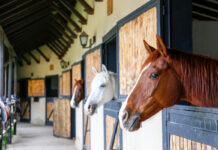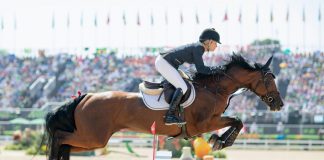 What makes your horse different from the horse in the stall over? Why doesn’t a Kentucky Derby contender walk like a Budweiser Clydesdale? Why don’t either of them look like Thumbelina, the current Guinness World Record holder for the world’s smallest living horse? The domestic horse comes in a range of sizes, shapes, and temperaments—from the tiny American Miniature Horse to the massive draft breeds, humans have historically bred horses for both aesthetic and functional qualities. For the horse in particular, size and conformation have been two major driving forces for the development of the diverse breeds we see today. Horses have been bred to pull carts, jump fences, or run a mile-long race. When horse breeders look to improve these abilities in their stock, they are often selecting for changes in genes, called alleles, that affect body size and conformation.
What makes your horse different from the horse in the stall over? Why doesn’t a Kentucky Derby contender walk like a Budweiser Clydesdale? Why don’t either of them look like Thumbelina, the current Guinness World Record holder for the world’s smallest living horse? The domestic horse comes in a range of sizes, shapes, and temperaments—from the tiny American Miniature Horse to the massive draft breeds, humans have historically bred horses for both aesthetic and functional qualities. For the horse in particular, size and conformation have been two major driving forces for the development of the diverse breeds we see today. Horses have been bred to pull carts, jump fences, or run a mile-long race. When horse breeders look to improve these abilities in their stock, they are often selecting for changes in genes, called alleles, that affect body size and conformation.
Body size and complex disease genes can only be identified through the DNA analysis of hundreds of horses from many different breeds and types. Your horse has a unique pattern of genes that, when compared to other horses, can give a clue to the genes and interactions that control body size. The research team at Brooks Equine Genetics Lab at Cornell is currently conducting an ongoing study on the genetics of body size in the horse. DNA can be isolated from almost any cell in the body, and in this case the skin tags from a routine tail hair pull will supply more than enough DNA to analyze. In addition to this hair sample, the study will require a profile photo, 3-generation pedigree, and 35 measurements of your horse. These measurements will help the researchers judge the size and conformation of your horse relative to other horses, and are an essential component of the study. The entire process should take only about 15 minutes of your time per horse. All information is strictly confidential.
Every individual horse is an important contribution to our study and another step towards improving the quality of life for both horses and humans.
For more information, please contact the Brooks and Sutter Genetics Labs at (607) 254-8217, equinegenetics@cornell.edu or at (607) 253-3592, sutterlab@cornell.edu.






Thank you for the interesting article.
Cool!
Just use the information for good, not evil! Don’t let the bad guy scientists get ahold of it! 😉
They’re are so many interesting things happening this summer! 🙂
I want to participate.